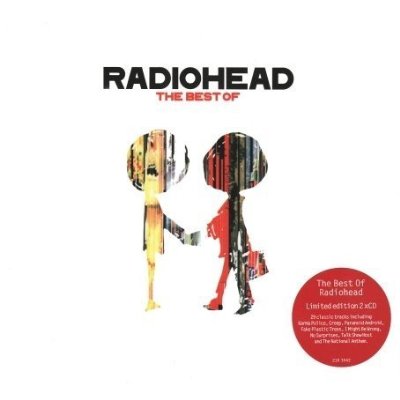And so, by giving away their album for nothing (sort of) and jumping ship to XL Recordings, Radiohead took aim at the listing hulk of EMI Records and let loose a polite salvo of fuck you that, although not delivering the coup-de-grace, blew off the flagpole and made an unholy mess of the captain’s cabin.
Would it be too far-fetched to suggest, then, that this appallingly sequenced compilation is an act of malicious retaliation from EMI?
Selecting a tracklisting for a Greatest Hits set is always a difficult task of course, but zero effort has been put in here. It seems that a bunch of sweating, callow execs, knees knocking in terror before the omniscient Guy Hands at the thought they might soon be out of a job, were forced together in some darkened room, and picked Radiohead song titles at random from the garter belt of a trembling EMI workie.
The reason that Radiohead were such a fascinating band in a 1990s music scene populated by the deeply conservative guitar groups of Britpop was their progression from mopey post-grungers with rooster hair, to the introspective glory of The Bends, to defining a new prog with the aloof, politicised sounds of OK Computer, and then pushing the envelope (admittedly sometimes just their own) with everything since.
Yet this fascinating trajectory is all but invisible here. ‘Just’ opens the first disc, to be followed, like a cartoon bulldog with gloriously swinging bollocks chasing a terrified feline, by the gloriously preposterous epic of ‘Paranoid Android’. It then proceeds ‘Karma Police’, ‘Creep’, ‘No Surprises’, ‘High And Dry’, a jarring, nonsensical, confusing hodge-podge. It’s like reading Paul’s letters to the Corinthians before you’ve bothered with the Gospels.
Even worse for EMI, this insane shuffle is exactly the sort of thing that devalues music, making it ripe for downloading illegally. Radiohead have made themselves appear pioneers, their former paymasters are left looking like fools. And there’s the more serious point, too. This moribund collection is the reality of the society that Radiohead obliquely portrayed and predicted in OK Computer, a culture of shuffle, of quick gratification, unrewarding moments and rank exploitation. Radiohead have done well to escape.


